Chapter 11 5. History of the monarch
In contrast to Pericles' pathetic appearance, the pharaoh of Egypt seemed to be a god.
The ancient Egyptians' reverence for the pharaoh seems almost morbid today.The greatest honor of the officials and nobles at that time was to be able to kneel down in front of him and kiss his footprints; the most worthy of boasting was that they had never been whipped by him in their entire lives.His name cannot be pronounced, because it is said that there is irresistible magic in it.There is an eagle in his royal title, which is the pictorial symbol of the sun god, just like the "three-legged bird" in the Chinese sun.
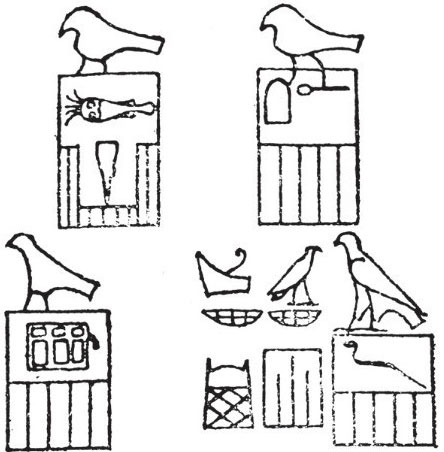
These are the titles of the four pharaohs of the first dynasty of Egypt. The first of them, Narmer, also named Menes, was the one who merged Upper and Lower Egypt and was the earliest pharaoh of ancient Egypt.All four pharaohs had eagles in their titles.
The eagle god Horus was originally the local "protector god", and later became the common god of upper and lower Egypt.Pharaoh is the incarnation and representative of the protector of the country in the world. He is the "son of the sun god" and becomes one of the gods after death. Even the Hyksos who ruled Egypt said so.Such authority is of course beyond doubt.It was only in the later period of the empire that the local rulers who challenged the center called themselves "sons of Thoth, the moon god".
That's right, the essence of the monarchy is "sovereignty rests with the king, and the power of the king is granted by God."
Of course the Son of God must live in the temple.In fact, "Pharaoh" originally meant "palace".Calling a king Pharaoh is like calling an emperor "Your Majesty" and a prince "Your Highness."They have to live in the palace even after death, but the palace is called "Perimus", which is the pyramid.
Gods have temples, kings have palaces, and the imperial court is of course called a "temple".
However, the monarch is not a god, nor should he be a god.The earliest monarchs were originally tribal chiefs.They were called "Yin" at first.Yin, just held something in his hand, and the oracle bone inscriptions are very similar to "Father".
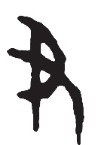
"Yin" in Oracle Bone Inscriptions ("Oracle Bone Inscriptions" A1712).
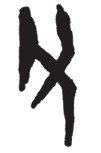
The "father" of oracle bone inscriptions ("Continued Oracle Bone Inscriptions" B971).
Father, also took something in his hand.It's just that Yin is holding a "stick" in his hand, while his father is holding an "axe".
But some people say that what my father is holding is also a "rod", and others say that what my father is holding is actually a "torch", so he is a "leader of the future", that is, "leading brother" or "backbone".
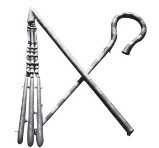
Egyptian pharaoh scepter.
In fact, it doesn't matter whether the father or Yin is holding a torch, an axe, or a staff.Because no matter what he takes, it means he has "command power".Therefore, whether it is a torch, an ax or a staff, they are all "batons".Later, it became "commanding knife".Later, it became a "scepter".
At the same time, Yin became the "jun" of the monarch.
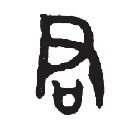
The "Jun" (Tianjun Ding) in bronze.
Jun, from Yin Congkou, that is, the tribal king or chief is giving orders, and it is the "ethnic group" who obeys orders.Group, originally cannot be used to describe people.But this is the concept before the Spring and Autumn Period.By the Warring States period, Jun had become the leader of the "crowd".However, the group is a "jun" above the word "sheep", indicating that "jun" was originally a shepherd, such as "jiang" or "qiang".It is not without reason that the tribal chiefs in the Yao-Shun alliance are called "Mu" (Twelve Mu).
Apparently, Jun was the laborer at first, and he was the patriarch of the clan; later, he was the leader, and he was the chief of the tribe; finally, he was the ruler of the country, and he was the monarch, the lord, the king, and the emperor.
The "jun" as a laborer and leader was originally a charismatic person.They stand out when the ethnic group overcame thorns and thorns, slashed and burned, and broke through the siege.If you plan, you will be clever; if you hunt, you will be brave; if you meet the enemy, you will be able to command;It is certainly not difficult for such a person to gain the sincere respect and support of the people and become a well-deserved leader.They may even be revered as gods after death for special contributions, such as Dayu.
Therefore, "jun" becomes "lord".
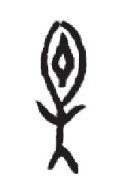
Oracle's "Lord" (A 150).Xu Shen's "Shuowen Jiezi" explained it as "the fire master in the lamp", that is, the wick.
Later, it became the "master" and "ruler", and even "savior".
This is a completely different path from democracy.
Notes:

These are the titles of the four pharaohs of the first dynasty of Egypt. The first of them, Narmer, also named Menes, was the one who merged Upper and Lower Egypt and was the earliest pharaoh of ancient Egypt.All four pharaohs had eagles in their titles.

"Yin" in Oracle Bone Inscriptions ("Oracle Bone Inscriptions" A1712).

The "father" of oracle bone inscriptions ("Continued Oracle Bone Inscriptions" B971).

Egyptian pharaoh scepter.

The "Jun" (Tianjun Ding) in bronze.

Oracle's "Lord" (A 150).Xu Shen's "Shuowen Jiezi" explained it as "the fire master in the lamp", that is, the wick.
Notes:
